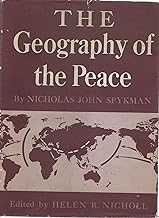
We are confronted today with the spectacle of the great nations of the world engaging in a tremendous struggle for sheer physical power. Millions of tons of steel and gunpowder, billions of dollars, and untold quantities of human energy are being hurled against each other in the attempt of rival groups of men to establish their ideas and principles as the basis for a world order. The situation suggests that neither the self-evident truth of our principles nor the divine basis of our moral values is in itself enough to assure a world built in the image of our aspirations. Force is manifestly an indispensable instrument both for national survival and for the creation of a better world. Yet, at the very moment when the most fundamental values of our civilization are being saved from complete destruction only by the exercise of naked power, studies of the nature of power in international relations and investigations into the strength and weakness of the power position of our own country are met with raised eyebrows and shocked disdain. There is a tendency, especially among certain liberals and many who call themselves idealists, to believe that the subject of power in the international world should not be spoken of except in terms of moral disapproval. They consider that studies concerning the organization of peace and security should deal only with the ideals of our democratic civilization and visions of a better world order in which power will play no part.
As a matter of fact, political ideals and visions unsupported by force appear to have little survival value. Our Western democracies certainly owe their existence and preservation to the effective use of power, either on their own part or on the part of an ally. The British Empire, France, the Scandinavian countries, and certain small states of Europe have, in the past two centuries, developed the blessings of democracy to their highest point. Since 1940, however, Norway, Denmark, Holland, Belgium, and France have been forced to live under the heel of a ruthless dictator, and many of the monuments associated with the struggle for liberty in Britain are now gaping bomb craters and piles of rubble. The small states had no power and Great Britain and France neglected to develop theirs. The fate of our whole civilization has depended on whether an invaded Russia, the British Empire with its back to the wall, and the United States coming in at the last moment, could develop quickly enough the instruments of force necessary to defeat their common enemy. That adversary had built up great agglomerations of power which were intended to destroy for a thousand years to come all those values that are the meaning and pride of Western civilization. Only the combined force of the United Nations was able to prevent the accomplishment of this end.

